

Symptoms of Gluten Sensitivity or Intolerance. Health Impacts of Gluten Sensitivity. Gluten Cross-reactivity. Gluten-Free Diets. Gluten Sensitivity and the Gut Microbiome. Gluten Intolerance Testing. Not Just Wheat Gluten. The Celiac MD Articles - Amy Burkhart M.D., R.D. The Gluten Doctors. TrulyGlutenFree – Purehealth Clinic. Welcome to the TrulyGlutenFree section.

This is for people who suspect or have a gluten related disorder (not just coeliac disease!) , a grain sensitivity – or who are not getting well! You will find a whole raft of articles, research, tips etc in the TGF blog category here. And the full Gluten Plan with how to test and treat effectively here. Access a load of free and paid-for resources here.
You can read the original introductory article (2009!) And, so you’re far from alone with it, come and chat on the special closed TrulyGlutenFree Facebook group here – there are some really supportive and knowledgeable peeps on there who WILL help you! Introduction. Celiac and Gluten Sensitivity Specialist Amy Burkhart, M.D., R.D. Why no one should eat grains. Part 1 – The tip of the Iceberg – Rosemary Cottage Clinic Blog. Introduction Whilst ‘only’ 1% of the population is strictly coeliac, there is mounting evidence that a much larger proportion are harmed by gluten.

In this series of posts I’ll draw on the most up to date research which is revealing the incredible web of health implications linked to cereal grain consumption. The gluten iceberg is a pertinent metaphor for this hidden, and much larger, mass of problems that lurk below the surface. As researchers begin to unravel the complexities of the sub-surface gluten iceberg it is sobering to realise that its dimensions remain largely unknown, yet evidence is now indicating that all of us are affected to some degree. As a clinician I get to see first hand how a grain-free diet can be key to making significant medical progress in patients with complex and apparently unrelated medical problems.
Why no one should eat grains. Part 2 – The definitive guide to Non Coeliac Gluten Sensitivity – Rosemary Cottage Clinic Blog. In the past few years it has become apparent that “classic” coeliac disease represents the tip of the iceberg of an overall disease burden – Anna Sapone, BMC medicine, 2011 In part 1 we looked at coeliac disease which affects 1% of the population worldwide, but forms only the tip of the gluten iceberg.

In this post I will examine the research around the emerging clinical entity known as Non Coeliac Gluten Sensitivity which affects at least six times as many people. In brief. Why no one should eat grains. Part 3: Ten more reasons to avoid wheat – Rosemary Cottage Clinic Blog. Wheat’s long shadow: does anyone escape its effects?

In part 1 we looked at Coeliac Disease (CD) which affects 1% of the population worldwide, but forms only the tip of the gluten iceberg. In part 2 we looked at the latest research on Non Coeliac Gluten Sensitivity (NCGS) which affects 6% of the population. In part 3 we look at ten areas of research that illustrate how gluten’s long shadow affects the lives of the remaining 93%. Introduction.
Gluten – what we learned in 2016 (part 1) – Rosemary Cottage Clinic Blog. ▲ Image: Pawel Kuczynski “Give us this day our daily bread (…) but deliver us from evil” —Matthew 6:11, 13 This is an update on our previous series of articles “Why No One Should Eat Grains” which were published in 2015; we recommend you read them too if you want to get your brain around this topic (before gluten makes toast of it!)
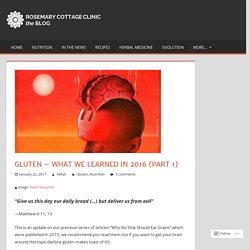
: Contents. Gluten – what we learned in 2016 (part 2) – the Great Imitator – Rosemary Cottage Clinic Blog. 20+ conditions related to gluten – a review of some 2016 papers Please feel free to share this infographic or the whole post!
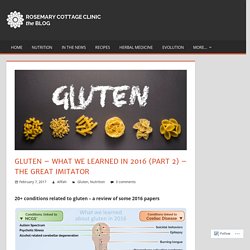
In part 1 we looked at some of the key developments in understanding gluten sensitivity (coeliac and non-coeliac gluten sensitivity) that emerged in 2016. In part 2 now we take a look at some case studies, and small trials that link gluten to a wider range of conditions. Read time: 18 minutes (2400 words) Gluten Update April 2017 – Rosemary Cottage Clinic Blog. Gluten Sensitivity - IMPORTANT Updates. 5 Different Types of Allergies To Gluten And Wheat.
The Gluten Doctors: Gluten Intolerance Can Develop with Age. I received this email earlier today (the blanks you see are to preserve her anonymity): “We corresponded a few months back when you were kind enough to answer a question about gluten for my final paper at _______ College.

I have since finished that program and am enrolled at the Institute of _________. Since the 1st, I have led some friends in a modified cleanse that was simply avoidance of alcohol, sugar, caffeine, dairy, gluten. I have tried omitting gluten before for a few weeks and never noticed anything, so I went into this experience expecting the same outcome, no reaction to gluten. Well, I have had bread twice over the course of the two weeks. “Anyway, I know you probably hear these stories every day.
While I don’t know her exact age, she is a recent college graduate and is now enrolled in a graduate program for nutrition, so we can assume mid- twenties. The Gluten Doctors: Steps to Deal with a Gluten Intolerance. If you’ve recently been diagnosed with celiac disease or gluten sensitivity you’re probably feeling a bit disoriented and confused.
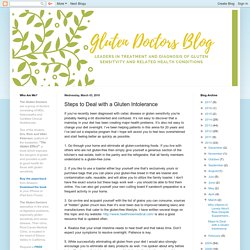
It’s not easy to discover that a mainstay in your diet has been creating major health problems. It’s also not easy to change your diet overnight. I’ve been helping patients in this arena for 20 years and I’ve laid out a stepwise program that I hope will assist you to feel less overwhelmed and start feeling better as quickly as possible. 1. Have a Wheat Sensitivity? Study Shows Lasting Physical Effects. The Overlapping Area of Non-Celiac Gluten Sensitivity (NCGS) and Wheat-Sensitive Irritable Bowel Syndrome (IBS): An Update. How to Overcome Gluten Sensitivity - DrAxe.com.
Gluten sensitivity is a cluster of symptoms related to a reaction to the protein found in the wheat plant called gluten.
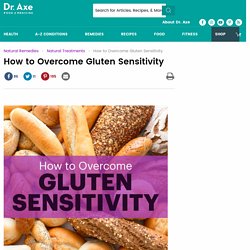
The severe form of gluten sensitivity is Celiac’s disease, but gluten can also cause other less severe symptoms, such as joint pain, headaches, fatigue and poor memory. Causes of gluten sensitivity include genetics, leaky gut syndrome, fungal infection and genetic modification of wheat. Gluten Sensitivity Diet Non-gluten-containing grains: Quinoa, buckwheat, arrowroot, millet, potatoes and rice.Fruits and vegetables: Fruits and vegetables are unlimited and can provide essential nutrients.Lean protein: Helps keep cells and muscles healthy, especially for those who have struggled with Celiac disease, which can lead to malnutrition.Non-gluten flours: Use flours like coconut four and almond flour in baking. Gluten Freedom - Dr. Alessio Fasano - The Gluten Intolerance Group of North America. The Gluten Doctors: Probiotics Reduce Inflammatory Response of Gluten. The Spanish researchers utilized different strains of Bifidobacterium, a friendly probiotc found in healthy intestines, to counteract the inflammatory effects of gliadin on intestinal epithelia [cells].
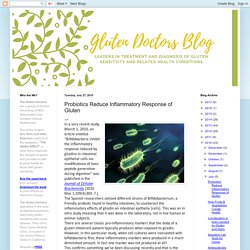
This was an in vitro study meaning that it was done in the laboratory, not in live human or animal subjects. There are several classic pro-inflammatory markers that the body of a gluten intolerant patient typically produces when exposed to gliadin. However, in this particular study, when cell cultures were inoculated with bifidobacteria first, these inflammatory markers were produced in a much diminished amount. In fact one marker was not produced at all! This confirms something we’ve been discussing recently and that is the importance of restoring balance to those trillions of microorganisms called the microbiota or probiotics that are responsible for much of the actions of our immune system.
Celiac Disease Symptoms List. Validation for Non-Celiac Gluten Sensitivity. The Gluten Doctors: Is There Really an Asymptomatic Celiac? Below is a follow-up response from the same reader with celiac disease who was concerned about his family. They didn’t want to find out if they were gluten sensitive or not, despite having a multitude of health issues. I post it here because it brings up a very good point that I see mentioned in the literature, and that is a person called an “asymptomatic celiac”. I always wondered if they were truly asymptomatic or if they were labeled as such because they didn’t present with the “classic” celiac symptoms of weight loss, diarrhea and digestive complaints.
Such a narrow grouping of symptoms is truly outdated by today’s standards but this gentleman was initially diagnosed over a decade ago when much less was known about celiac and gluten sensitivity. Confirming my suspicions, he makes the following statements: Self Diagnosis of Gluten Sensitivity-Four alarming trends. Self-Diagnosis of Gluten Sensitivity: Four Alarming Trends Ten years ago gluten was a foreign word to the general population. Today it is part of our mainstream culture, and gluten-related news and health articles stream across our computer screens. Unfortunately, online health advice in pop culture spreads faster than scientifically sound medical information.
Too frequently, the result is that people are skipping valid testing and self-diagnosing gluten sensitivity, sometimes with the encouragement of their practitioners. A new Australian study sheds light on self-diagnosis and the accompanying health risks, while an article in Scientific American assesses the state of knowledge about gluten sensitivity. New Study Vindicates William Davis: Modern Wheat is more Toxic than Ancient Varieties – Rosemary Cottage Clinic Blog. Scoop: trial demonstrates that ancient wheat reduces symptoms of IBS compared to modern varieties In his New York Times bestseller, Wheat Belly, cardiologist William Davies claimed that wheat is the primary driver of obesity, heart disease and a host of other metabolic and digestive problems.
His controversial claim is based largely on his clinical experience, the story of which is truly remarkable: since he started advising his cardiac patients to cut all forms of wheat and wheat products from their diets, he has not had a single patient suffer a heart attack! Critics of Davis’ anti-wheat stance, suggest that any benefits from a wheat-free diet are simply those associated with a low-carb diet, and that outside coeliac disease, wheat itself is no more problematic than any other carbohydrate.
Controversially, Davies claims that wheat has been altered through centuries of selective breeding, such that modern wheat varieties are now effectively ‘toxic’ to humans. Testing for celiac disease before starting a gluten free diet. If you like this article, please follow me on Facebook, Instagram or Twitter for similar information. Blog coming February 2017! Six Reasons To Test For Celiac Disease Before Starting A Gluten-Free Diet Many people ask me “ Why can’t I just start a gluten-free diet and see if I feel better?
Why do I need to spend the money on testing? Still think gluten sensitivity isn’t real? Cooling Inflammation: Transglutaminase, Gluten, Celiac, Inflammation, Autoimmunity. The point of this post is that the intestines produce an enzyme, transglutaminase (TG) that normally protects the gut from toxic plant proteins, such as grain gluten, but modern food processing and antibiotics corrupt digestion of gluten to produce intestinal inflammation and a series of related autoimmune diseases including celiac, thyroiditis, diabetes, baldness and atherosclerosis. Transglutaminase Links Proteins Enzymatically Transglutaminase is a ubiquitous enzyme produced in the intestines, thyroid, heart, skin, hair follicles, etc.
This enzyme attaches to a protein (TG + ProA ~~> TG-ProA) via amino groups extending from some of the protein's amino acids, e.g. lysine or glutamine, and then the enzyme replaces itself by another protein leaving the two proteins crosslinked (TG-ProA + ProB ~~> TG + ProA-ProB). Another alternative reaction is to leave the original glutamine without its amino group to yield glutamic acid residues. An Update On Non Celiac Gluten Sensitivity.
This is a post from the Gut Critters blog that ended November 18, 2016. Ray Medina gave permission for his material to be copied as long as it was attributed to him and not used for commercial purposes. – kiraonysko
Debunking Myths on Gluten Intolerance - Abbey's Kitchen. Differentiating Gluten Related Disorders. 3 Reasons Gluten Intolerance May Be More Serious Than Celiac Disease. How Common is Gluten Sensitivity? I’ve long suspected that everyone has some degree of sensitivity to gluten, even if they’ve never been formally diagnosed and even if they don’t notice any overt symptoms after eating it. Is Gluten Sensitivity Real. Video Talk: Alessio Fasano - Spectrum of Gluten-Related Disorders (57 minutes) What type of gluten intolerance do you have? Clinical and diagnostic aspects of gluten related disorders. US perspective on gluten related diseases. Whole Health Source: Eating Wheat Gluten Causes Symptoms in Some People Who Don't Have Celiac Disease. Irritable bowel syndrome (IBS) is a condition characterized by the frequent occurrence of abdominal pain, diarrhea, constipation, bloating and/or gas. If that sounds like an extremely broad description, that's because it is.
The word "syndrome" is medicalese for "we don't know what causes it. " IBS seems to be a catch-all for various persistent digestive problems that aren't defined as separate disorders, and it has a very high prevalence: as high as 14 percent of people in the US, although the estimates depend on what diagnostic criteria are used (1). It can be brought on or exacerbated by several different types of stressors, including emotional stress and infection. Maelán Fontes Villalba at Lund University recently forwarded me an interesting new paper in the American Journal of Gastroenterology (2). Study Says: Wheat Belly is All in Australians' Head. And in Fact, the Peer-Reviewed Scientific Evidence for Non-Celiac Gluten-Sensitivity is Scarce, But Probably Not Non-Existent - SuppVersity: Nutrition and Exercise Science for Everyone. A recent study from the CSIRO Food Futures National Research Flagship and the University of Adelaide says: The data indicate that many adult Australians are consciously avoiding consumption of wheat foods, predominantly without any formal diagnosis.
Reported symptoms suggest a physiological but not allergenic basis to this behavior. Sensitivity to wheat, gluten and FODMAPs in IBS: facts or fiction? Abstract. What is gluten, and why is it bad for some people? What is Gluten? What Are The Issues With Consuming Wheat? Does not everyone love to eat bread? Nothing, is better then the smell of a fresh loaf of bread baking in the oven.
The Genetics of Gluten Sensitivity. 45 Facts About Gluten You Should Be Aware Of. How Long Does it Take the Gut to Repair after Gluten Exposure? - The Paleo Mom. This is a very relevant question for those who are just embarking on their gluten-free journey. But, it’s also extremely important for anyone who has been following a paleo/primal/gluten-free diet for a while, but has been inadvertently exposed to gluten.
It sometimes feels as though the longer we avoid gluten, the more sick we feel after accidentally eating some. This is in large part because the body stops protecting itself from gluten (for example, there may be less mucus in the gut) so when we do consume some, we are defenseless. It may also be because we forget how we used to feel and are so used to feeling so much healthier. Whether you are new to paleo or have been eating this way for a while, a common question is: how long does it take the gut to heal after gluten exposure?
What does this mean? For those with confounding factors, healing is slower. Video: Gluten Free Eating: Fading Trend or New Norm? – Nutrition QED. The Conundrum of Gluten Sensitivity and Autoimmunity - Why Tests are Often Wrong.